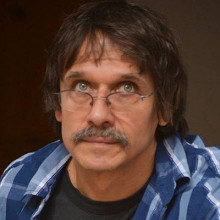Polish literature

Wacław Holewiński
born in Warsaw in 1956, graduate of Law at the University of Warsaw, prose writer, playwright, literary critic, publisher, editor.
From the 1970s to the 1980s, he was active in the anti-communist opposition. From 1977, he was a collaborator of the Independent Publishing House, and from 1978 until the declaration of martial law, he managed the Independent Publishing Cooperative I. From March 1981, he was an employee of the National Coordination Committee of the Independent Students' Union. From January to August 1982, he was interned. In December 1982, together with Jarosław Markiewicz, he founded “Przedświt”, one of the most important underground publishing houses of the 1980s. In May 1984, he was arrested; he was released by virtue of amnesty in August the same year. After 1989 (until 2001), he continued the activity of “Przedświt” publishing house. In 1995, in a gesture of protest, he resigned from work at the Warsaw prosecutor's office.
He is a prose writer penetrating the ‘uncharted areas of Polish history’ (Marek Nowakowski). He published his first novel Lament nad Babilonem (Lament over Babylon) in 2003 and received a distinction award in the competition for the Józef Mackiewicz Literary Award. In this book, as one of the first authors in Polish literature, he portrays one of the Cursed Soldiers, breaking the stereotypes and clichés accumulated around this subject, referring, at the same time, to the model of realistic prose, successfully combining facts and even documents with fiction. Simultaneously, he renewed the convention of the biographical novel. In this novel, the plot is based on the fate of the main character, Tadeusz Danilewicz, but shown in a non-linear, snapshot, quasi-film way, creating a specific mosaic reflecting the drama of an individual in history, but also the opaque essence of history, especially of 20th century Poland.
History was the background of Holewinski's subsequent novels and stories, in which, based on often fragmented accounts and documents, he reconstructed the dramatic fate of people rebelling against totalism, fighting for freedom, rebellious, uncomfortable, faithful to their values. At the same time, he asked questions about the importance of such values as honour, faith, Polishness, patriotism, courage, but also, for example, betrayal.
In the novel Opowiem ci o wolności (Let Me Tell You About Freedom), awarded with the Józef Mackiewicz Literary Award, he described the parallel biographies of two young Polish women, NSZ (National Armed Forces) soldiers, who fought in the Second World War against Germany, and were imprisoned after the war by the Secret Police. The protagonist of the novel Honor mi nie pozwala (Honour Does Not Allow Me) is Stanisław Ostwind-Zuzga: a Jew, legionnaire, policeman, soldier of the National Armed Forces and the National Military Union, one of the first victims of Secret Police. In the novel Szwy (Stiches) and short stories from the volume Nie tknął mnie nikt (No One Touched Me), modern Polish history and questions about the consequences of not having dealt with the reality of communism appeared.
The issues of the artist, art, and its relation to everyday life, as well as the vivid picture of the era, dominate the biographical novel Droga do Putte (Road to Putte) devoted to the Flemish painter Jordaens. On the other hand, in the psychological dramas from the volume Dyfuzja (Diffusion), the writer mainly analysed human attitudes towards evil.
Holewiński also engages in literary criticism. In the 1990s, he was a reviewer at ‘Gazeta Polska’, he also discussed the latest literature on Wnet Radio. From June to October 2016, together with Katarzyna Wójcik, he ran the literary program The Master and Catharina on Polish Radio Three. From October 2016, he has been the deputy head of the literary editorial office at Polish Radio Two. He also runs a reviewing column Mebluję głowę książkami (I Furnish My Head With Books) on the portal pisarze.pl. He is a member of the Polish Writers’ Association (he was the deputy head of the organisation in 2008-2011), the Polish Journalists’ Association, as well as the Free Speech Association.
BIBLIOGRAPHY:
Novels:
- Lament nad Babilonem, Warszawa: Prószyński i S-ka, 2003; 2nd edition in 2013.
- Za późno na modlitwę, Warszawa: Prószyński i S-ka, 2003.
- Przeżyłem wszystkich poetów, Warszawa: Prószyński i S-ka, 2004.
- Choćbym mówił językiem ludzi i aniołów, Warszawa: Prószyński i S-ka, 2005.
- Droga do Putte, Wrocław: Wydawnictwo Dolnośląskie, 2007.
- Opowiem ci o wolności, Poznań: Zysk i S-ka Wydawnictwo, 2012.
- Szwy, Poznań: Zysk i S-ka Wydawnictwo, 2013.
- Honor mi nie pozwala, Poznań: Zysk i S-ka, 2015.
- Pogrom 1905, Poznań: Zysk i S-ka, 2018.
-
Pogrom 1906, Warszawa: Państwowy Instytut Wydawniczy, 2019
-
Oraz wygnani zostali, Warszawa: Państwowy Instytut Wydawniczy, 2020
-
Pogrom 1907, Warszawa: Państwowy Instytut Wydawniczy, 2020
Short stories:
- Nie tknął mnie nikt, Warszawa: Oficyna Wydawnicza „Agawa”, 2008.
Drama:
- Dyfuzja i inne dramaty, Sulejówek: Agencja Dramatu i Teatru, 2006.
Film scripts:
- Historia Roja (co-author, film premiere March 2016, the author obtained the court order to remove his name from the film due to excessive changes in the script).
Other:
- Selection of Dzienniki of Krzysztof Mętrak, Warszawa: Iskry, 1997–1998.
TRANSLATIONS
Hungarian:
- A Puttéba vezető út: Jacob Jordaens festőművész életregénye [Droga do Putte], translated by Szenyán Erzsébet, Budapezst: Széphalom Könyvműhely, 2013.